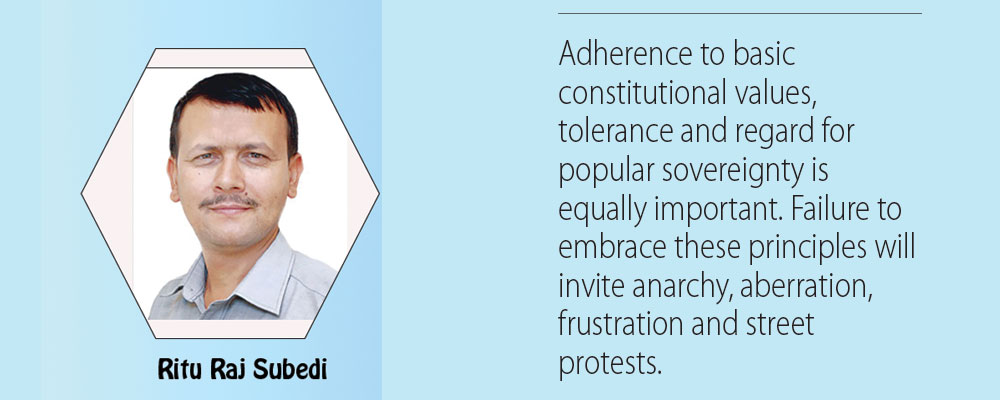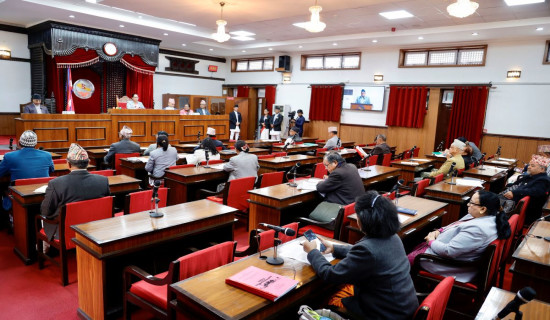- Friday, 6 February 2026
Respect Religious Sentiments Of All
As Nepal heads to consolidate the federal republican system, various latent conflicts have come to the fore. These conflicts range from distribution of powers and resources between the provinces and federation to the flare-up of the religious and identity disputes at the local level. Chief Ministers have been flexing muscles against the centre, demanding the necessary laws that equip them with legal, administrative and financial rights. These unintended developments belie the logic that the underlying structural problems would be resolved once the federal, republican and secular system is operationalised. No doubt, the country has undergone transformative political changes but the gap between the commitment and performance of the leadership has largely been blamed for the emerging mess.
Moreover, anarchy, indiscipline and behavioural deviation are also upsetting peace and moral ethos required for democratic nation building task. Discipline and respect for law are essential for democracy and constitutional norms to thrive and deepen. Nepali society is still laden with multiple fault lines at different layers. The country conducted two three-tier governments but the elected leaderships have not been able to translate the constitutional provisions into action. The situation is getting worse as the people in the responsible positions step out of line, triggering controversy and disturbing social harmony.
Irrational remarks
Just a few days back, a sitting minister, who also looks after the cultural affairs, stirred up a hornet’s nest by hurting the feelings of Hindus, who constitute over 80 per cent population in the country. He ran the gauntlet of public wrath. While the social media was filled with vitriolic criticisms and disapprovals of minister remarks, various pro-Hindu organisations and political parties sought action against him. His statements were not only irrational but also contained elements of incitement in the society. The sad part is that the minister continued to defend his remarks instead of apologising to the public. On the other hand, party with whom the minister is associated did not come up with a statement to contradict the minister’s remarks.
Similarly, the appointment of Laxmi Pun as executive director of Pashupati Area Development Trust (PADT) has courted controversy as Hindu supporters have claimed that she is a Christian and does not fit in that post. Lawmakers have crossed swords over Pun’s religious faith at a meeting of the International Relation and Tourism Committee of parliament that recently called the PADT’s office-bearers to enquire about her appointment. A lawmaker from Rastriya Prajatantra Party claimed that Pun was a Christian and her appointment as the PADT chief was an insult to Hindus.
However, a female lawmaker of the CPN-Maoist Centre said that there was no ground of the accusation against Pun. She insisted it was unfair to question the integrity of Pun just because she is a woman. The Committee had instructed the concerned ministry and PADT to submit documents related to Pun’s appointment, academic certificates, experience certificates and personal details within three days.
Sometime back, Dharan Sub-metropolitan City Mayor Harka Sampang had removed the pictures of the President and Prime Minister and hung the photograph of ancient Kirat king of Kathmandu Valley - Yalambar. Sampang, who won the election as independent candidate, has openly challenged the authority of the centre. Writing on his Facebook page, he said that he would fix the pictures of heads of state and government only when the centre gives importance to Dharan. Apparently, the move is a part of his protest against the federal government. But the way he contested federal government has put him in hot water. Mayor Sampang is known for his eccentric acts and rants, which have led to decline in his popularity he attained during and after the election.
This is not the first time elected representatives have been dragged into controversy for removing the photos of the heads of state and government. Some months ago, Kathmandu Metropolitan City Mayor Balen Shah had put up a picture of Greater Nepal instead of the President and Prime Minister in his chamber. Balen’s step came in response to the Indian government’s decision to display a mural that includes Nepal’s territories, including Kapilvastu and Lumbini in its newly built parliament building. Unlike Sampang, Balen still commands popularity for his unorthodox style of working. But his rude manner of criticising the big parties also got him into trouble.
Negative implications
The controversies surrounding the people’s religious faith bear negative implications for the society. They do not only undermine the spirit of secularism but also give credence to the argument that secularism was not adopted through a due process. This distasteful scenario comes to light at a time when the voices against secularism and republican set-up are heard in the streets. The social fabric weakens if religious sentiments of people are hurt knowingly and unknowingly.
Nepal’s constitution has envisaged cooperative federalism in which three-tier of governments have specified rights, powers, resources and jurisdictions. At the heart of decentralisation of powers lies the philosophy that the federal governance is capable of addressing the inherent disparities and providing justice to the marginalised communities. However, this administrative arrangement is not only expensive and complex but also demands broader understanding, mutual cooperation and political culture. Adherence to basic constitutional values, tolerance and regard for popular sovereignty is equally important. Failure to embrace these principles will invite anarchy, aberration, frustration and street protests.
(The author is Deputy Executive Editor of this daily.)

















